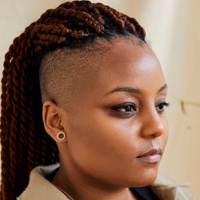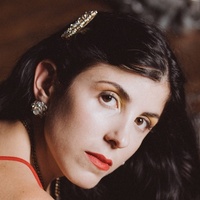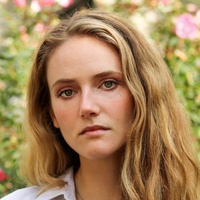As told to Claire Donato, 2371 words.
Tags: Writing, Sound, Performance, Education, Process, Identity, Mental health, Time management.
On carving out space to reflect
Writer and interdisciplinary artist Shayla Lawz discusses making time for yourself and the things you want to create.You released your first book, speculation, n., in October, 2021. Can you talk a bit about how the book came to fruition?
speculation, n. came together in three stages. First, I considered theory and reflected on police brutality and the Black Lives Matter protests. I wondered: How do Black people feel when we see our images on the screen? What do these images do for the Black psyche? I looked to Fred Moten, Saidiya Hartman, and Hortense Spillers’ work on the spectacle to help me think these questions. I didn’t know what form my writing would take, I just began writing into this space while considering things I’ve seen and felt.
As I wrote, more questions emerged. What does it mean to share and witness in a public way? What does that mean in terms of how we see ourselves? Is there a responsibility that we have to share these images to build social awareness, or is there a responsibility we have to our mental health to evade them? My initial drafts began with fiction, then moved toward poetry or a mix between the two, where I was trying to relay a narrative of what it’s like to see and feel these images.
That was the beginning: writing those poems, thinking about those images and how we can insert another image within them through writing. In witnessing Black suffering, there is a constant barrage of emotional distress, which is a kind of recognition wherein I see this person on the news, and it could be me, or it could be me next. I needed to reflect on that feeling and on what evading it meant. The call to reflect turned into these poems, and the poems turned into a performance which tries to get at that question.
I wanted to know what it meant to present these images in my body. By taking them from the news and social media, putting them into these poems and then performing them, it inserts the images into my physical being. So what did it mean to perform that and how did that make me feel? The performance worked itself into the book and into that narrative.
Those are the first two junctures of creating the book. After I had a manuscript, I felt like something was missing. I thought about what comes after you’ve made those images, what new image is created, and is there room for something after that? It became a process of considering Black futurity.
Which Black futurist thinkers and writers influenced the project?
There are two writers I always think about: Octavia Butler and Lucille Clifton. When I think about Clifton, I think about the bridge between star shine and clay in her poem “Won’t You Celebrate With Me,” and what that one image does for imagining. A lot of speculative music and imagery and music videos also influenced the book. Artists I think of are Sun Ra and Sun Ra’s Arkestra, and also Missy Elliott. I see Elliott’s work as a spaceship or Jeep to space, which she creates in her style and through her videos.
What is your personal relationship like with social media, with email, with other online platforms, and with your computer and phone?
It changes. I mentioned the process of passing around a video and becoming aware of an event because someone recorded it, which is very important, but also what it feels like to be overwhelmed. There was a time where I wasn’t really on social media. I needed safety from seeing images that I knew would be harmful.
So, I was absent from the internet after having been very online. It’s interesting when you go back, and it’s as if you missed part of how the internet works. I’m in that space now where I am enjoying certain parts of social media and sharing certain things or thinking of the community, but there’s still paranoia around those images.
You currently teach at Pratt Institute in Brooklyn. Can you talk a bit about your classes, and how the classes you teach affect your writing practice, and how your writing practice affects your teaching practice?
My classes are consistently teaching me something, and I feel like the relationship between my work and my classes is why I went into teaching. My work is always influenced by conversations I have in classes with my students, whom I really love.
From the beginning, I’ve been teaching Animation Narrative, which has been really interesting because my students are all digital arts majors. I’m coming from a practice that produces images from narrative and the students are coming from an opposite practice—they’re used to using images to tell the story. It’s a beautiful combination of what we both bring and what we can teach each other in that exchange. I’m constantly impressed not only by their work, but also by their flexibility to begin and leave class with a kind of new vision of what’s possible.
I also teach an elective, The Digital Body, which I originally taught at Rutgers Camden. Interestingly, I first taught that class online: I never actually saw my students in person. We consider extended mind theory, and the idea that our thoughts and memories extend to our environment, because of the digital inundation I talked about earlier. The students produce amazing work in The Digital Body, and I’m challenged and delighted by the ways they push concepts forward, or even reject those concepts and come up with their own.
How do you nourish your creative side when you aren’t working, whether that work is teaching at Pratt or writing?
I’m trying to find a balance. The pandemic has made things interesting. We’ve at once had much more time and much less time. I’ve found meditation and holding a routine outside of teaching are ways to nourish my creativity and the work I do. If there’s something that delights me in class or some interaction, I make sure to carve out a space for me to reflect on it and return back to it later in the week.
Throughout the pandemic, I’ve heard a lot of people say that the weekend doesn’t feel like the weekend anymore—the two days don’t feel sufficient. So I’ve tried to create space in the week where I’m not afraid to relax, which makes room to think. If I have space to think, then the writing opens up for me.
How do you create a space in which to relax throughout the week? That seems challenging and like something about which a reader might need advice!
I try to establish a boundary where I don’t obsess about what has to come next. I try to take each day as it is. Today is Wednesday. I teach on Thursdays. In past semesters, I might have said, I need to prepare all day Wednesday, even though today is beautiful outside. Instead, I go for a walk, go to a cafe and decide there is time to carve out in that space without laboring, which helps the anxiety that may come with trying to do both at the same time.
It’s so easy to obsessively lesson plan or get wrapped up in anxiety about the days to come. Perhaps the meditation practice you noted has something to do with being able to establish that boundary. If you can just be, then there’s a boundary established from projecting into the future. Do you have a specific meditation practice and, if so, what is it?
I do a guided mindfulness meditation every morning. There are different forms I choose, and they’re usually focused on even breathing. I think even breathing is my favorite guided meditation. Each day I go on this app, and there’s a button for how I feel. So I normally check in and then it guides what meditation I’m doing for that day, but even breathing consistently helps anxiety, or helps me have that spaciousness.
You spoke about the pandemic in a previous answer. I’m curious to hear how the pandemic has affected your processes of writing, reading, and thinking.
In terms of everyday circumstances, things don’t feel as urgent. My routine shifted, and I was able to make those considerations about how to spend time, because we were afforded more time in a way, because we were at home.
My practice, although I did a lot less writing, became more a time to reflect and think about other work. I read a lot of poetry. And reread a lot of books that have influenced me. Overall there is a slowness that allowed me to reflect on my process in the last 10 years, reflect on where it is now and how it emerged.
Could you walk us through when you first began practicing in earnest? Where were you, with whom were you working? What were you making at that time and how have you grown since then?
I’m all about saying there are different junctures. This first wasn’t the most serious moment where I recognized, oh, I want to be a writer. In fifth grade my teacher had a poetry contest where everyone submitted a poem sent in for the contest. And honestly half the kids were published in the book, but it gave me an idea that I am a writer because I’m published in fifth grade. That was the first moment of belief.
My creative writing practice seriously started in college, taking workshops and learning from writers who had books out and who told me for the first time that I had something interesting to say. They believed I had a story. Those are the first moments.
Are there any specific teachers who were important to you along the way and why?
At Rutgers I took creative writing workshops, but there was also a professor who was my literature professor for a number of classes, literature and digital studies, which I think is what later informed my interdisciplinary practice. Martin Gliserman was my professor for creative writing there for fiction, as well as Belinda McKeon, Paul Blaney and Joanna Fuhrman, who were really supportive. Later, during my MFA at Brown, Colin Channer, Carole Maso and Joanna Howard were my mentors—and Thalia Field, who I think came in at the exact right moment where it was my last semester.
There were a lot of people at Brown doing experimental work, but I was trying to figure out where my voice was within that. What did I want to say? Thalia came in and taught performance and had us perform every week. It was in performing that I felt what I was creating could be more than text, or it could live in different forms.
Can you talk about your relationship to the community that you made at Cave Canem, the teachers with whom you worked, and how your time there influenced the book?
It’s like I said earlier, when someone or something comes at the right moment for what you’re creating. Cave Canem was at a moment where I had a lot of my manuscript and I was wondering what the book could be or look like. I went to the retreat in summer 2019, right after grad school. You’re there for a week. It’s a beautiful room of Black poets and everyone from the African diaspora. Their mission is to support Black writers. And they lead all these workshops. The retreat is a space where people can kind of come together in a more casual way, but also there’s this component, which surprised me, where a poem is due every night.
There’s an energy that takes over the space, which is really beautiful and special. We were tasked with writing a brand new poem every night to bring to workshop the next day. Getting that perspective became really important because Cave Canem was somewhere I definitely wanted to go before finishing my book. I really wanted those eyes on the book. I wanted to know what Black writers would see from this world I’m imagining us in. The support and care within that program is something that was really special at that time.
Do you have a community in Brooklyn that supports your writing practice?
Most of the time I’ve been in Brooklyn, which is about three years, we’ve been in the pandemic. I have a writing community, we’re all near each other now, probably in Brooklyn, but it’s a virtually sustained practice. It is loving and supportive, but I’m also looking forward to coming together. Cave Canem has workshops actually in Brooklyn, and getting to experience those kinds of things in person again would feel great.
Did you perform virtually during the pandemic and what was that like?
Yes, it’s been very interesting to figure out how to adapt performance to a virtual audience, and sometimes to people I don’t even see. It feels like every virtual performance or reading has been new, even if I’m reading the same work, because I have to figure out how to give an experience that’s not the same as being in person, within the present modalities, that challenges the narrative or makes the narrative as clear as it could be in person. I’ve enjoyed it. It’s also very exhausting.
What are some of your dreams and desires for the next year, both personally and in relationship to your practices?
I’m wishing for those initial feelings of inspiration. The first feeling you get when you want to write something. I don’t know if I could consider that a dream, but I would say it feels like that to me.
I’m always desiring and dreaming of peace and even dreaming of the feeling of peace. Maybe that’s related to the meditation practice every morning. Whether it’s in creating or life, family, friendships, romance, etc. I wish for peace with all my interactions. So that’s both maybe a dream and desire.
Shayla Lawz Recommends:
Glitch Feminism - Legacy Russell
Playground Coffee Shop/Playground Annex, Bed-Stuy Brooklyn
The Animal Indoors - Carly Inghram
Life Wellness Center, Bed-Stuy Brooklyn




